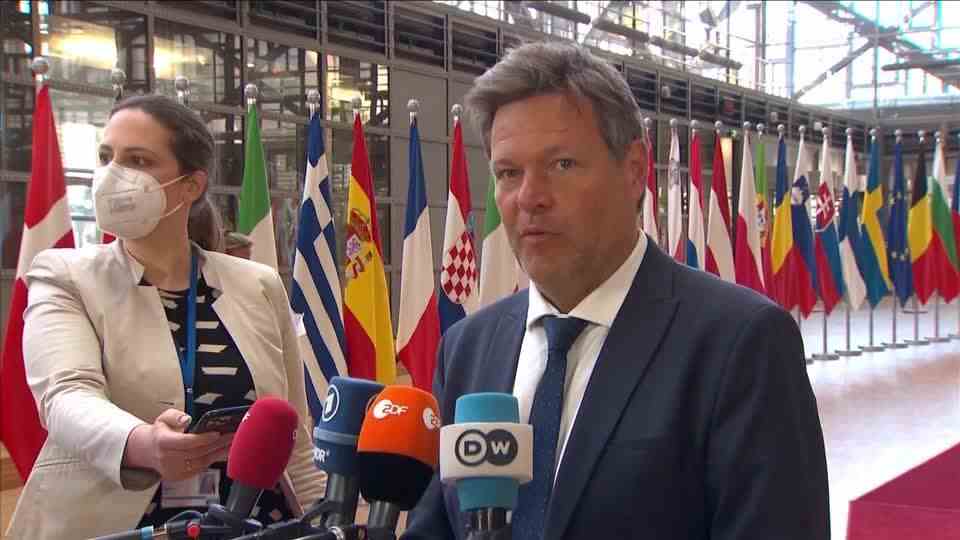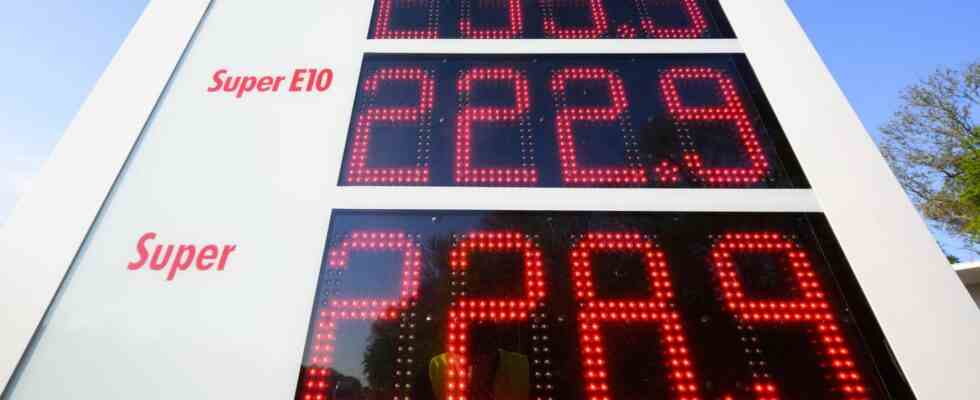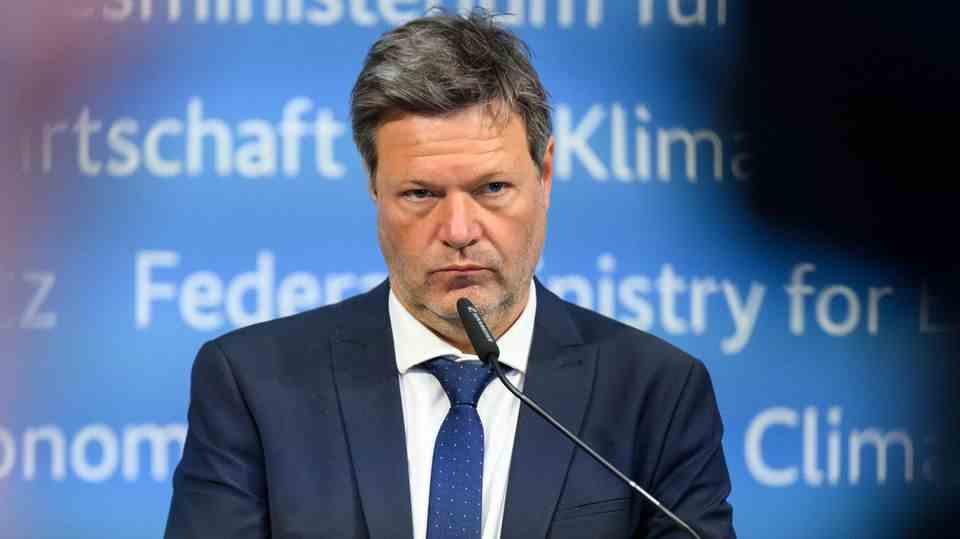Answer questions
sanctions
Higher prices and more unemployment? An EU oil embargo harbors considerable risks
Experts expect prices to rise if there is an oil embargo against Russia
© Julian Stratenschulte / DPA
The EU Commission sets the course for an oil embargo against Russia. But what does that mean for Germany? Higher petrol and oil prices are almost unavoidable. Answers to the most important questions.
From next year, not a drop of oil should come from Russia. This is what the EU Commission plans for a sixth package of sanctions. The new support for Ukraine could be expensive for consumers and the German economy. An overview:
What exactly is the EU Commission proposing now?
Specifically, according to the information, it is planned that after a phase-out phase of six months an import ban for crude oil will apply and after a phase-out phase of eight months an import ban for oil products will also apply. It should also play a role whether oil is delivered by pipeline or by ship. But the front is not closed. Exceptions should apply to Hungary and Slovakia because both are more dependent on Russian oil.
What is the current standing?
This Wednesday, the permanent representatives of the EU states in Brussels want to deal with the proposals sent out by the Commission during the night. If there are no more major objections from the capitals, the embargo could then be decided in the coming days together with other new Russia sanctions.
How badly will the new embargo hit Russia?
Proponents hope the consequences will be serious. At the beginning of the year, Russia was still exporting half of its daily almost five million barrels of crude oil to Europe. Half of the three million barrels of oil products, i.e. diesel or heavy oil, also went west. The oil that has so far flowed through the Druzhba pipeline – about 750,000 barrels per day – is unlikely to be completely diverted to other countries, even with expensive ship transport. The only pipeline to the east is busy anyway.
Oil production fell by nine percent in April. Finance Minister Anton Siluanov expects a decline of 17 percent by the end of the year. Further losses could be painful, as oil revenues account for around 30 percent of Russia’s budget. So far, Moscow has been able to bear the losses. The high oil prices make up for some of this, because the Kremlin still assumed a significantly lower oil price when planning the budget.
How dependent is Germany on Russian oil?
Germany now sees itself reasonably well prepared. Without Russian deliveries, no “oil crisis” is to be expected, Habeck recently said. According to him, the share of Russian oil in German consumption has fallen from 35 to 12 percent within a few weeks. The remaining share of Russian oil of twelve percent is therefore attributable to Schwedt.
What could this mean for German consumers?
Federal Minister of Economics Robert Habeck (Greens) expects high “price jumps”. One of the reasons is that Russian oil must be replaced by probably more expensive alternatives from other countries. In addition, the conversion of refineries and delivery routes means effort and costs. But hardly anyone dares to predict when and to what extent refueling or heating will become more expensive.
The fact is: the market and price development depends on many factors, such as the dollar exchange rate and the decisions of the major producing countries. “No one can reliably predict how prices will develop after an oil embargo decision,” says mobility expert Marion Jungbluth from the Federal Association of Consumers. “The oil market has always been sensitive and prices volatile.” Energy expert Klaus-Jürgen Gern from the Kiel Institute for the World Economy dares to make the forecast: “Drastic price increases would not be inevitable.”
What can be done against the price increase?
The consumer advice center warns the federal government to keep a close eye on the prices at the pump. You have to intervene if corporations want to enrich themselves in the crisis, says Jungbluth with a view to possible profits from sudden changes in the market situation (windfall profits). The market transparency office for fuels and the Federal Cartel Office are required. “The energy tax cut that was passed on June 1, 2022 must be passed on to consumers on a one-to-one basis,” the expert demands.
Why is East Germany hit harder than West Germany?
The supply in East Germany depends for the most part on the two refineries in Central Germany in Leuna and on the PCK refinery in Schwedt/Oder. According to PCK, nine out of ten cars in Berlin and Brandenburg run on fuel from the refinery in Schwedt, Brandenburg. BER Airport also obtains kerosene from there. The Leuna refinery in Saxony-Anhalt supplies around 1,300 petrol stations in Saxony-Anhalt, Saxony and Thuringia. In addition, the East German refinery products are a lubricant for the chemical-pharmaceutical industry, which, according to the industry association, employs around 54,500 people in 160 companies. No one can predict how secure jobs will be. Economics Minister Robert Habeck writes in the latest progress report on energy security: “Particularly in East Germany, this process of becoming completely independent of Russian oil is demanding.”

Another problem: While Leuna is operated by the Totalenergies group and has been trying to gradually reduce the oil supply from Russia since March, Schwedt is a special case: the refinery is majority owned by the Russian state-owned company Rosneft and has of course made no moves so far, others to develop suppliers. The last resort in this case would be expropriation.
Are there any other possible unwanted side effects?
One risk is that an embargo will drive oil prices so high internationally that Russia will end up earning at least as much money with fewer exports as before. This could mean that oil becomes unaffordable for poorer countries. In turn, President Vladimir Putin could take advantage of this by selling Russian oil cheaper to poorer countries – on condition that those countries do not participate in Western sanctions against Russia. Not all politicians in Brussels, but also in capitals like Berlin and Washington, are convinced that an oil embargo is currently the smartest idea.
Why is the Commission nevertheless proposing an embargo?
The great pressure from the public probably played a not inconsiderable part in the decision. Many people find it difficult to understand that more than two months after the outbreak of war, the EU countries are still buying oil from Russia on a large scale and are thus indirectly supporting Putin’s government. According to estimates by the Bruegel think tank, Russian oil worth around 450 million euros was imported into the EU every day.


